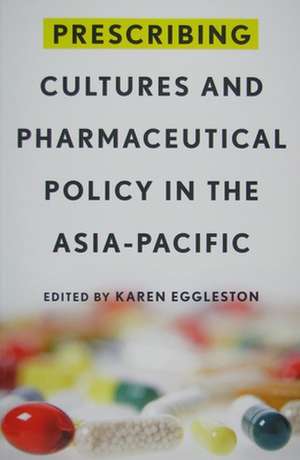Prescribing Cultures and Pharmaceutical Policy in the Asia Pacific
Editat de Karen Egglestonen Limba Engleză Paperback – 17 sep 2009
Pharmaceutical policies are interlinked globally, yet deeply rooted in local culture. Prescribing Cultures examines how pharmaceuticals and their regulation play an important and often contentious role in the health systems of the Asia-Pacific.
The first section of this timely book—which includes a foreword by Michael Reich of Harvard University—addresses pharmaceutical policy in China, Korea, Japan, Thailand, Taiwan, Australia, and India. The second section focuses on two crosscutting themes: differences in "prescribing cultures," especially among physicians, who are the primary dispensers of medicine in Asia, and the challenge of balancing access to drugs with incentives for innovation.
The book's contributors discuss important issues for U.S. policy, notably drug imports from Asia, regulation of global supply chains to assure drug safety and quality, and new legislation to encourage development of drugs for neglected diseases. In Prescribing Cultures, pharmaceutical policy serves as a window into the economic trade-offs, political compromises, and cultural legacies that shape regional and global health systems.
The first section of this timely book—which includes a foreword by Michael Reich of Harvard University—addresses pharmaceutical policy in China, Korea, Japan, Thailand, Taiwan, Australia, and India. The second section focuses on two crosscutting themes: differences in "prescribing cultures," especially among physicians, who are the primary dispensers of medicine in Asia, and the challenge of balancing access to drugs with incentives for innovation.
The book's contributors discuss important issues for U.S. policy, notably drug imports from Asia, regulation of global supply chains to assure drug safety and quality, and new legislation to encourage development of drugs for neglected diseases. In Prescribing Cultures, pharmaceutical policy serves as a window into the economic trade-offs, political compromises, and cultural legacies that shape regional and global health systems.
Preț: 260.19 lei
Nou
Puncte Express: 390
Preț estimativ în valută:
49.79€ • 51.44$ • 41.44£
49.79€ • 51.44$ • 41.44£
Carte tipărită la comandă
Livrare economică 26 martie-09 aprilie
Preluare comenzi: 021 569.72.76
Specificații
ISBN-13: 9781931368162
ISBN-10: 1931368163
Pagini: 380
Dimensiuni: 152 x 229 x 30 mm
Greutate: 0.68 kg
Editura: Brookings Institution Press
Colecția Shorenstein Asia-Pacific Research Center
ISBN-10: 1931368163
Pagini: 380
Dimensiuni: 152 x 229 x 30 mm
Greutate: 0.68 kg
Editura: Brookings Institution Press
Colecția Shorenstein Asia-Pacific Research Center
Notă biografică
Karen Eggleston is the director of the Asia Health Policy Program at Shorenstein APARC. Since 2003, she has also been a research associate at the China Academy of Health Policy at Peking University. In 2004, she served as a consultant to theWorld Bankon their project on health service deliveryin rural China.
Descriere
Pharmaceutical policies are interlinked globally, yet deeply rooted in local culture. Prescribing Cultures examines how pharmaceuticals and their regulation play an important and often contentious role in the health systems of the Asia-Pacific.
The first section of this timely book—which includes a foreword by Michael Reich of Harvard University—addresses pharmaceutical policy in China, Korea, Japan, Thailand, Taiwan, Australia, and India. The second section focuses on two crosscutting themes: differences in "prescribing cultures," especially among physicians, who are the primary dispensers of medicine in Asia, and the challenge of balancing access to drugs with incentives for innovation.
The book's contributors discuss important issues for U.S. policy, notably drug imports from Asia, regulation of global supply chains to assure drug safety and quality, and new legislation to encourage development of drugs for neglected diseases. In Prescribing Cultures, pharmaceutical policy serves as a window into the economic trade-offs, political compromises, and cultural legacies that shape regional and global health systems.
The first section of this timely book—which includes a foreword by Michael Reich of Harvard University—addresses pharmaceutical policy in China, Korea, Japan, Thailand, Taiwan, Australia, and India. The second section focuses on two crosscutting themes: differences in "prescribing cultures," especially among physicians, who are the primary dispensers of medicine in Asia, and the challenge of balancing access to drugs with incentives for innovation.
The book's contributors discuss important issues for U.S. policy, notably drug imports from Asia, regulation of global supply chains to assure drug safety and quality, and new legislation to encourage development of drugs for neglected diseases. In Prescribing Cultures, pharmaceutical policy serves as a window into the economic trade-offs, political compromises, and cultural legacies that shape regional and global health systems.










